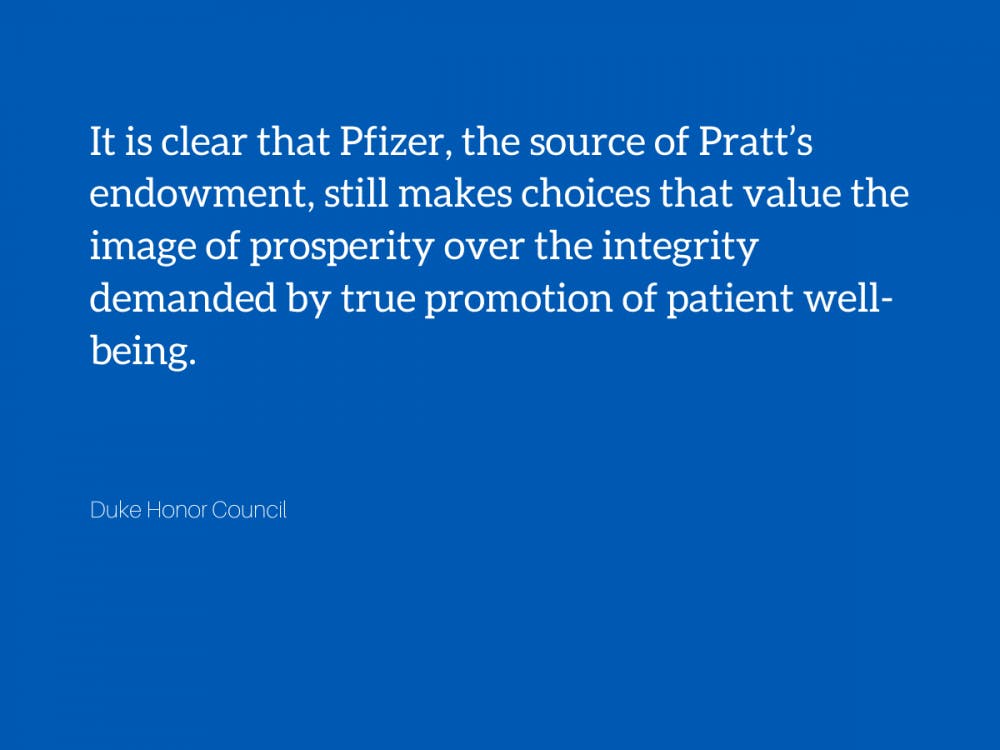Did the Pratt School of Engineering’s namesake believe in integrity over image?
Duke is undeniably one of the best engineering schools in the country. This reputation wouldn’t have been possible if it wasn’t for Edmund T. Pratt Jr.’s generous endowment of $35 million. This gift deemed him the namesake of the School of Engineering and ensured that he would be remembered. But what do we remember him for? His generous donation? His ability to take raise Pfizer’s revenues sevenfold in his time as CEO? Or do we remember him for his involvement in a company that consistently chose image over integrity?
In Pratt’s years as CEO of Pfizer, the company was involved in a major scandal. In the 1980s, Pfizer sold heart valves to thousands of patients, hundreds of whom died from the valve fracturing. In Pratt’s last year as CEO, it was uncovered that the company had deliberately withheld information from the government in an attempt to get the heart valve approved for the market faster. In other words, Pfizer knowingly allowed over 31,370 of these deadly medical devices to be implanted in patients, killing hundreds in the process.
It would be unfair to blame this tragedy entirely on Pratt. He was not directly responsible for what occurred. Even after Pratt left his position as CEO, Pfizer continued to bury itself under mountains of accusations and lawsuits. In 1996 Pfizer conducted an unauthorized clinical trial on 200 children in Nigeria involving a meningitis drug, Trovan. After the death of eleven children and causing paralysis, blindness, or deafness in many more, Pfizer still put the drug on the market. After this drug had been given to millions of people, the FDA finally labeled it as dangerous. The drug had to be withdrawn from the U.S. market. Additionally, in 2012, Pfizer was sued for misbranding its drug Protonix for the sake of profits, and sued again in 2016 for overcharging Medicaid for it. These are only a few of the many scandals Pfizer has been involved to date.
It is clear that Pfizer consistently made and still makes choices that value the image of prosperity over the integrity demanded by true promotion of patient well-being. We may never know the extent of Pratt’s involvement in Pfizer’s scandals during his time as CEO. But the question remains: was the money he donated legitimately earned if hundreds of patients suffered in the name of profit?
Regardless of how we choose to remember Edmund T. Pratt Jr., there is a great and tragic irony in this situation. Duke prides itself on being the first university to offer a biomedical engineering department. Not only that, Duke ranks #3 in the country for best undergraduate biomedical engineering programs, and #5 in the world for best biomedical engineering programs as a whole.
Every year many of the students who graduate from Duke’s biomedical engineering program go into the medical device industry. With the history of Pratt’s endowment in mind, many of these alumni will be faced with ethical dilemmas that could put thousands of lives at risk. For this reason, it is imperative that Duke instills a strong sense of “integrity over image” into its students. But biomedical engineers are not the only ones that will have to make this choice.
This is a choice we all need to make. And it is a choice worth making.
This column was written by Jaimie McKeel, a first-year biomedical engineering student.
Get The Chronicle straight to your inbox
Signup for our weekly newsletter. Cancel at any time.

